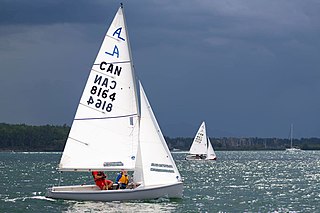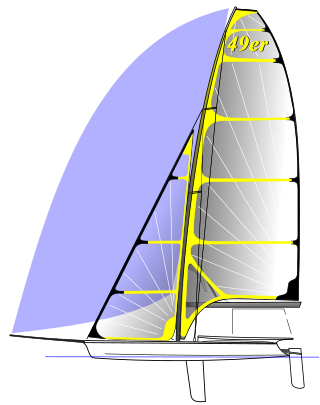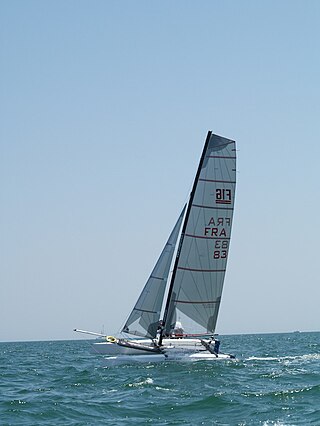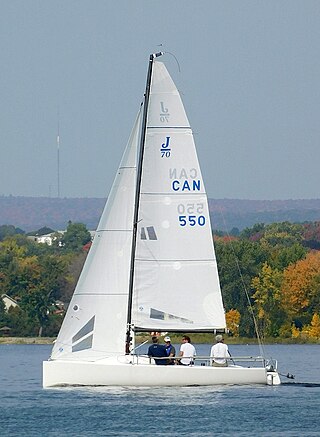
The Albacore is a 4.57 m (15 ft) two-person planing dinghy with fractional sloop rig, for competitive racing and lake and near-inshore day sailing. Hulls are made of either wood or fiberglass. The basic shape was developed in 1954 from an Uffa Fox design, the Swordfish. Recent boats retain the same classic dimensions, and use modern materials and modern control systems.

The Star is a 6.9 metres (23 ft) one-design racing keelboat for two people designed by Francis Sweisguth in 1910. The Star was an Olympic keelboat class from 1932 through to 2012, the last year keelboats appeared at the Summer Olympics.

The 470 (Four-Seventy) is a double-handed monohull planing dinghy with a centreboard, Bermuda rig, and centre sheeting. Equipped with a spinnaker, trapeze and a large sail-area-to-weight ratio, it is designed to plane easily, and good teamwork is necessary to sail it well. The name comes from the boat's length of 470 centimetres.

The International 2.4mR is a one-person keelboat. The class is a development class governed by the 2.4mR rule. The rule controlled by World Sailing is one of the few classes designated as an International Class. The International 2.4mR Class rule is closely related to the International 12mR class rule that was used at the America's Cup.

The 49er and 49er FX is a two-handed skiff-type high-performance sailing dinghy. The two crew work on different roles with the helm making many tactical decisions, as well as steering, and the crew doing most of the sail control. Both of the crew are equipped with their own trapeze and sailing is done while cantilevered over the water to the fullest extent to balance against the sails.

The Kiel Week or Kiel Regatta is an annual sailing event in Kiel, the capital of Schleswig-Holstein, Germany. It is considered to be one of the largest sailing events globally, and also the largest summer festivals in Northern Europe, attracting millions of people every year from all over Germany and neighbouring countries.

The Formula 16 (F16) sport catamaran is an ISAF recognised 5 m long beach catamaran with an asymmetric spinnaker setup.

The 29er is a two-person high performance sailing skiff designed by Julian Bethwaite and first produced in 1998. Derived from the Olympic class 49er class, it is raced in the ISAF Youth Sailing World Championships. The 29er is able to reach high speeds fairly quickly by having a sleek and hydrodynamic hull and will often exceed the wind speed when planing both up and downwind.

The Dragon is a one-design keelboat designed by Norwegian Johan Anker in 1929. In 1948 the Dragon became an Olympic Class, a status it retained until the Munich Olympics in 1972. The Dragon's long keel and elegant metre-boat lines remain unchanged, but today Dragons are constructed using the latest technology to make the boat durable and easy to maintain. GRP construction was introduced in 1973 and the rigging has been regularly updated.

The RS Feva is a two-person sailing dinghy designed by Paul Handley in 2002. It is manufactured and distributed by RS Sailing. The RS Feva is an International Sailing Federation (ISAF) International Class, a Royal Yachting Association (RYA) Supported Junior Class, and has been selected by the Dansk Sejlunion and Norges Seilforbund for major sailing growth projects.
The Dart 18 is a one-design 18-foot (5.5 m) long glassfibre sailing catamaran. It is designed to be sailed by two people and can achieve speeds of up to 20 knots. This is reflected in its Portsmouth Yardstick of 805 and D-PN of 76.3

The Topcat is a one-design sailing catamaran boat class which is divided into several boat sizes.
The Access 2.3 is a single-crew cat rigged sailing keelboat, which is recognised by the International Sailing Federation as an international class. It is typically regarded as being a beginner's dinghy.

The Nacra 17 is a performance catamaran used for sailing. It was designed in 2011, went into production in 2012 and has been the focus of multihull sailing at the Olympic Games since its conception.

J/70 is a trailerable, 6.93-metre (22.7 ft) American sailboat class designed by Alan Johnstone and first built in 2012.
The following were the scheduled events of sailing for the year 2017 throughout the world.
The following were the scheduled events of sailing for the year 2016 throughout the world.
The Para World Sailing Championships is an annual World Championship multi-class sailing regatta in para classes organised by the World Sailing.












